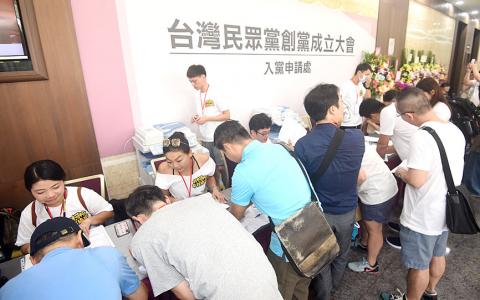Taipei Mayor Ko Wen-je (柯文哲) yesterday said that the Taiwan People’s Party (TPP) plans to nominate at least 34 candidates for legislator-at-large seats in the Jan. 11 presidential and legislative elections.
While Ko has yet to confirm whether he would run for president, he has said that one of the party’s goals is to win several legislative seats.
Following the TPP’s formal establishment on Tuesday and his election as chairman, Ko said in a radio interview later in the day that the party would nominate the maximum number of candidates for 34 legislator-at-large seats, because they should have “the determination to fight across the world (征戰天下).”

Photo: Liao Chen-huei, Taipei Times
Asked by reporters to elaborate on his plans, Ko yesterday said that he did not want to repeat the New Power Party’s (NPP) strategic mistake in the 2016 legislative elections, when it only nominated six candidates for legislators-at-large.
Although the NPP had a high approval rating of more than 10 percent before the elections, many of its supporters thought that if it received more than the needed number of votes for six seats, the excess votes would be wasted, so some turned to vote for Democratic Progressive Party (DPP) candidates, Ko said.
He added that he also has to think of the gender equality requirement for legislators-at-large and the risks of a nominee dropping out.
The NPP caucus is facing the risk of being dissolved, as it requires three party members to form a caucus, Ko said.
He was referring to the NPP’s suspension last month of Legislator Kawlo Iyun Pacidal amid allegations of influence peddling and abuse of power.
Asked if he aims to replace the NPP in the Legislative Yuan with his party’s members, Ko said the TPP is still searching for suitable nominees, but it can only recruit new members after it receives the Ministry of the Interior’s official approval.
Winning legislative seats from constituency votes will be more difficult for the TPP, so it will focus on securing legislator-at-large seats next year, he said.
Nominees who fail to secure a seat next year can serve as assistants or office director for those who do, which should help train them for future posts, he said in the interview.
Asked if he is worried that the TPP might attract unwanted members from other parties because it allows dual-party membership, Ko said that he hopes to transcend the pan-blue and pan-green camps with this strategy, so people of either camps can exist harmoniously in society.

Taiwan is to commence mass production of the Tien Kung (天弓, “Sky Bow”) III, IV and V missiles by the second quarter of this year if the legislature approves the government’s NT$1.25 trillion (US$39.78 billion) special defense budget, an official said yesterday. Commenting on condition of anonymity, a defense official with knowledge of the matter said that the advanced systems are expected to provide crucial capabilities against ballistic and cruise missiles for the proposed “T-Dome,” an advanced, multi-layered air defense network. The Tien Kung III is an air defense missile with a maximum interception altitude of 35km. The Tien Kung IV and V

The disruption of 941 flights in and out of Taiwan due to China’s large-scale military exercises was no accident, but rather the result of a “quasi-blockade” used to simulate creating the air and sea routes needed for an amphibious landing, a military expert said. The disruptions occurred on Tuesday and lasted about 10 hours as China conducted live-fire drills in the Taiwan Strait. The Civil Aviation Administration (CAA) said the exercises affected 857 international flights and 84 domestic flights, affecting more than 100,000 travelers. Su Tzu-yun (蘇紫雲), a research fellow at the government-sponsored Institute for National Defense and Security Research, said the air

Taiwan lacks effective and cost-efficient armaments to intercept rockets, making the planned “T-Dome” interception system necessary, two experts said on Tuesday. The concerns were raised after China’s military fired two waves of rockets during live-fire drills around Taiwan on Tuesday, part of two-day exercises code-named “Justice Mission 2025.” The first wave involved 17 rockets launched at 9am from Pingtan in China’s Fujian Province, according to Lieutenant General Hsieh Jih-sheng (謝日升) of the Office of the Deputy Chief of the General Staff for Intelligence at the Ministry of National Defense. Those rockets landed 70 nautical miles (129.6km) northeast of Keelung without flying over Taiwan,

A strong continental cold air mass is to bring pollutants to Taiwan from tomorrow, the Ministry of Environment said today, as it issued an “orange” air quality alert for most of the country. All of Taiwan except for Hualien and Taitung counties is to be under an “orange” air quality alert tomorrow, indicating air quality that is unhealthy for sensitive groups. In China, areas from Shandong to Shanghai have been enveloped in haze since Saturday, the ministry said in a news release. Yesterday, hourly concentrations of PM2.5 in these areas ranged from 65 to 160 micrograms per cubic meter (mg/m³), and pollutants were